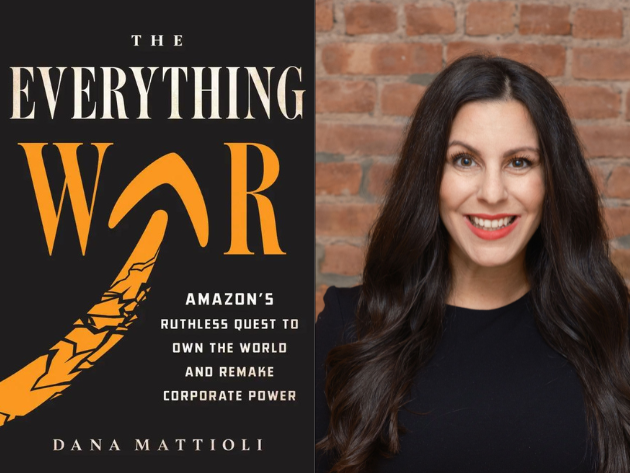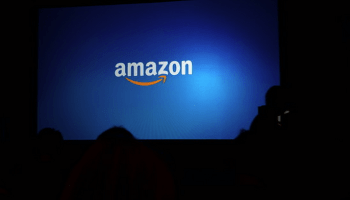
This week on the GeekWire Podcast: A conversation with Dana Mattioli, Wall Street Journal reporter and author of the new book, “The Everything War: Amazon’s Ruthless Quest to Own the World and Remake Corporate Power.”
Mattioli spoke with more than 600 people for the book, including current and former senior Amazon leaders who were interviewed without the company’s knowledge. The book examines Amazon’s approach to expanding its dominance, the culture established by Jeff Bezos and other senior leaders, and the practices that led to the Federal Trade Commission’s antitrust suit against the company.
Amazon disputes a number of the book’s assertions, as detailed in the episode.
This week brought a new twist in the FTC lawsuit, as the agency asked a federal judge to order Amazon to disclose details about internal use of Signal’s disappearing messages by Bezos, Amazon CEO Andy Jassy, and others. Amazon called the agency’s assertions baseless, saying it has been forthcoming on the issue.
Listen below, and continue reading for excerpts from Mattioli’s comments, edited for clarity and length, along with Amazon’s responses to GeekWire about specific issues raised by the book, after it was published this week.
The process of reporting the book: “I spent three years reporting it. We had hundreds of pages of internal documents. So many sources spoke to me, and I tried to get as many of them as I could on the record. It’s a damning look inside Amazon’s business practices. And I knew it needed to be bulletproof in terms of my sourcing.”
Amazon’s lax internal controls for confidential data: “I learned that Amazon, even though they’re one of the biggest, most sophisticated companies in the world, has very primitive firewalls in place to protect confidential data.
“That’s not limited to private-label. [Amazon teams have allegedly used third-party seller data to advantage the company’s own products.] I heard this in other areas of the company, as well, especially its venture capital arm.
“There’s an anecdote in the book where a founder who’s meeting with the Alexa Fund for an investment sets up a data room, and she puts all of her proprietary information in that data room. Amazon’s also her competitor, so it’s an uncomfortable situation. She learned almost immediately that there were people throughout the Amazon organization, not affiliated with the Alexa Fund team, looking at her proprietary documents.
“As one employee told me, ‘The company still had operated in this really startup-y way, meaning you often had access to data for your job that you didn’t need access to. When you’re moving fast, you’re not really thinking clearly about, “Well, how do we make sure that only the right people have access to this dataset?” The internal infrastructure of the company is basically popsicle sticks, and like duct tape.’ “
Amazon’s response: “We do not condone the misuse of proprietary confidential information, and thoroughly investigate any reports of employees doing so and take action, which may include termination. We have strict policies in place and keeping proprietary information secure is embedded into how the team operates.”
“We use publicly available data to inform our strategy in service of providing the best experience for our customers. But we draw a clear line against using non-public, seller-specific data to compete with sellers, and our policy goes further than any retailer we know of.
“We take this policy seriously — we thoroughly train on it, audit, and investigate any reports of violations. Public allegations of policy violations have been based on misunderstandings and not on credible evidence. Any suggestion that there was pressure from Amazon executives to violate this policy in developing our private brands is flat out incorrect.”
The role of Amazon’s culture: “I’ve covered companies for nearly 18 years at the Wall Street Journal. This culture is so different from any company I’ve ever covered. I think some of the senior leaders aren’t aware of how much pressure this environment creates for their employees.
“That’s why it reminded me of Wells Fargo. It wasn’t like the CEO of Wells Fargo was saying, ‘Open up all these accounts; don’t tell the clients.’
“Some people describe it a little bit like ‘The Hunger Games,’ where you have to perform, and you’re competing against equally brilliant employees every day, and none of you wants to be in that bottom 6%. None of you wants to risk getting cut before you get to your restricted stock units. It does incentivize some people to do things that they’re not supposed to do.
“Jeff Bezos is not directly telling them to do that, of course, but it happened.”
Amazon’s response on this issue, which was also raised in the book: “This is false, and not supported by any material the author has presented. Amazon’s culture centers on innovating for customers to make their lives better and easier.”
How social media posts by Amazon execs undermined the company’s public policy work: “The D.C. team is trying to mend bridges and make connections on the Hill and thwart litigation that could break Amazon up or hurt it.
“They had a process called ‘watering the flowers’ where they were trying to make friends and influence people on the Hill. And then Jeff and his team would often come in and just stomp all over those flowers, and send mean tweets to people that this team was trying to cozy up to, and it just undermined the efforts.”
Parallels to Standard Oil: “Standard Oil was also doing things like spying on their competitors. Even though this was not the digital age, they had near-perfect intel on the oil refining environment because of how big they were. And that’s a theme that comes up in my reporting on Amazon: Private label, Alexa Voice Services, the Alexa Fund.
“One of the tactics that Standard Oil was also criticized for was predatory pricing, and forcing competitors to sell to them under the threat that, if you don’t, then we’ll put you out of business.
“There’s a scene in the book where Amazon threatens predatory pricing toward Diapers.com, and says, if you sell to someone else, we’ll cut the price of our diapers to zero, which brings it to its knees. So there are some parallels.”
Amazon’s response: “Standard Oil Trust controlled roughly 90% of the refined oil in the United States. Amazon accounts for about 4% of U.S. retail. Any comparison of the two companies is not based in reality.”
[Editor’s Note: Amazon represents about 40% of US ecommerce sales.]
Amazon’s impact on prices: “The FTC is alleging that, because sellers know they need to be on Amazon — 40% of all ecommerce in the U.S. happens there — that Amazon is able to levy all sorts of fees on them. And that’s exploded in recent years. … As a result of that, sellers have had to raise their prices for consumers to offset all the fees.”
Amazon’s response: “The company fundamentally disagrees with the FTC’s allegations because they are wrong or misleading, and they would harm consumers and independent businesses.”
Mattioli’s motivation for writing the book: “What I hope this book does is that it lifts the veil on a purposefully secretive company, that it reveals to readers just how Amazon wins all the time, and shows instances of how Amazon has its fingers on the scale. And I think we achieved that.”
Amazon’s response: “Amazon’s success is the result of continually innovating for consumers and small businesses over three decades to make their lives better and easier every day. The facts show Amazon has made shopping easier and more convenient for customers, spurred lower prices, enabled millions of successful small businesses, and significantly increased competition in retail.”
“The Everything War: Amazon’s Ruthless Quest to Own the World and Remake Corporate Power,” by Dana Mattioli, was published by Little Brown on April 23.
Subscribe to GeekWire in Apple Podcasts, Spotify, or wherever you listen.



